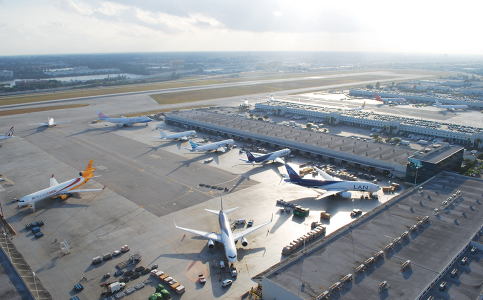Deal to double Miami International Airport cargo capacity stalls
Advertisement

A Miami-Dade committee Tuesday deferred Mayor Daniella Levine Cava’s call to reject an unsolicited proposal and instead directly negotiate with the joint venture to build and run a vertical air cargo hub at Miami International Airport (MIA), where cargo demand is rising.
Members of the Airports and Economic Development Committee argued for more time to analyze the proposal by Commissioner Raquel Regalado for building a patented “Vertically Integrated Cargo Community” (VICC) at no cost to the county.
The $2 billion privately funded project proposes a 50-year lease to develop a five-level, 1,706,575-square-foot structure able to yearly handle 4.95 million tons of cargo, more than double present use.
The structure is to rise in four-plus years on 29.4 acres of Aviation Department land in the MIA West Cargo area. The total site would be 41.4 acres, the county land plus two parcels it doesn’t own totaling 12 acres.
Commissioner Jean Monestime criticized the measure to proceed without a competition. “In my view, I don’t know how fair it is to enter a 50-year commitment without more vetting,” he said. He said Atlas Air, the airport’s top cargo carrier, already expressed concerns over the VICC as Atlas has its own expansion plans.
“Which is why we’re exploring things like the VICC and why we’re also talking to Atlas, the FEC [Florida East Coast Railway], and others as part of our overall cargo plan,” said Aviation Director Ralph Cutié. “We have committed to Atlas as of last week that we will work very closely with them on their expansion proposal and coordinate that also with the VICC and others.”
“Something like this requires a true competition,” Mr. Monestime said. “This has not been properly vetted.”
Ms. Regalado proposed an amendment directing the mayor to ensure that any agreement for the vertical project does not include land within the Florida East Coast Railway corridor or directly adjacent to it, or conflict with the Atlas plan, and to report to commissioners with a committee review if negotiations fall through.
Nonetheless, action finally was deferred. “What I’d like to do is be able to move from this meeting without having made a decision on the item just yet,” said Chairman Keon Hardemon. In that way, “the next time it comes it can either have your change through your proposed amendment, because you have every right to do that, or it can be as it is, but give us an opportunity to have just a bit more time with it before we make a decision on that.”
The VICC is to double MIA’s cargo capacity to 5.59 million annual tons in less than five years and help the airport remain top nationwide in international freight, number three among US airports for total cargo, and number nine worldwide in international freight traffic.
CCR USA Airport Management Inc. and AIRIS USA LLC made their unsolicited proposal in October 2020 and the mayor granted approval to begin evaluating it in February 2021. In November, Greg Chin, aviation communications manager, told Miami Today the department “had not yet determined how we want to proceed.”
CCR USA is part of the CCR Group, a publicly-traded group based in Brazil, operating at 19 airports in Central and South America and the Caribbean. Airis USA has developed and planned over 20 million square feet of cargo and related airport facilities.



